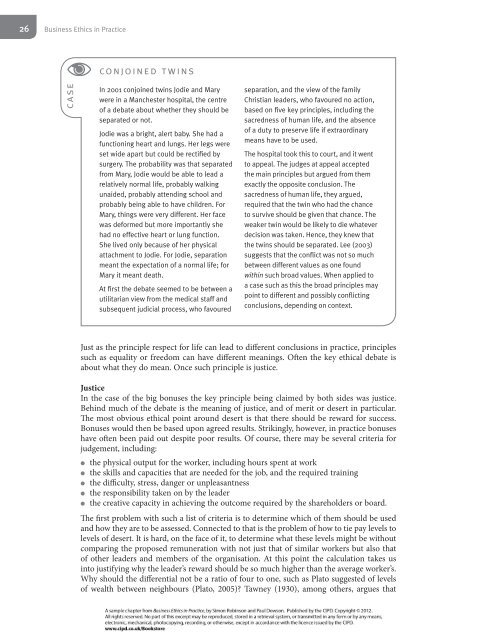normative Ethical theory - CIPD
normative Ethical theory - CIPD
normative Ethical theory - CIPD
Create successful ePaper yourself
Turn your PDF publications into a flip-book with our unique Google optimized e-Paper software.
26Business Ethics in Practicecaseconjoined twinsIn 2001 conjoined twins Jodie and Marywere in a Manchester hospital, the centreof a debate about whether they should beseparated or not.Jodie was a bright, alert baby. She had afunctioning heart and lungs. Her legs wereset wide apart but could be rectified bysurgery. The probability was that separatedfrom Mary, Jodie would be able to lead arelatively normal life, probably walkingunaided, probably attending school andprobably being able to have children. ForMary, things were very different. Her facewas deformed but more importantly shehad no effective heart or lung function.She lived only because of her physicalattachment to Jodie. For Jodie, separationmeant the expectation of a normal life; forMary it meant death.At first the debate seemed to be between autilitarian view from the medical staff andsubsequent judicial process, who favouredseparation, and the view of the familyChristian leaders, who favoured no action,based on five key principles, including thesacredness of human life, and the absenceof a duty to preserve life if extraordinarymeans have to be used.The hospital took this to court, and it wentto appeal. The judges at appeal acceptedthe main principles but argued from themexactly the opposite conclusion. Thesacredness of human life, they argued,required that the twin who had the chanceto survive should be given that chance. Theweaker twin would be likely to die whateverdecision was taken. Hence, they knew thatthe twins should be separated. Lee (2003)suggests that the conflict was not so muchbetween different values as one foundwithin such broad values. When applied toa case such as this the broad principles maypoint to different and possibly conflictingconclusions, depending on context.Just as the principle respect for life can lead to different conclusions in practice, principlessuch as equality or freedom can have different meanings. Often the key ethical debate isabout what they do mean. Once such principle is justice.JusticeIn the case of the big bonuses the key principle being claimed by both sides was justice.Behind much of the debate is the meaning of justice, and of merit or desert in particular.The most obvious ethical point around desert is that there should be reward for success.Bonuses would then be based upon agreed results. Strikingly, however, in practice bonuseshave often been paid out despite poor results. Of course, there may be several criteria forjudgement, including:●●●●●●●●●●the physical output for the worker, including hours spent at workthe skills and capacities that are needed for the job, and the required trainingthe difficulty, stress, danger or unpleasantnessthe responsibility taken on by the leaderthe creative capacity in achieving the outcome required by the shareholders or board.The first problem with such a list of criteria is to determine which of them should be usedand how they are to be assessed. Connected to that is the problem of how to tie pay levels tolevels of desert. It is hard, on the face of it, to determine what these levels might be withoutcomparing the proposed remuneration with not just that of similar workers but also thatof other leaders and members of the organisation. At this point the calculation takes usinto justifying why the leader’s reward should be so much higher than the average worker’s.Why should the differential not be a ratio of four to one, such as Plato suggested of levelsof wealth between neighbours (Plato, 2005)? Tawney (1930), among others, argues that

















